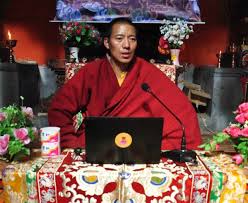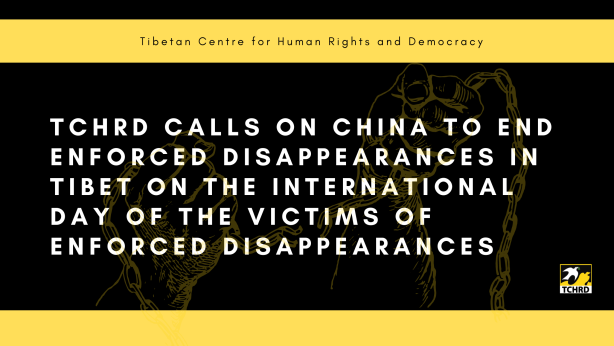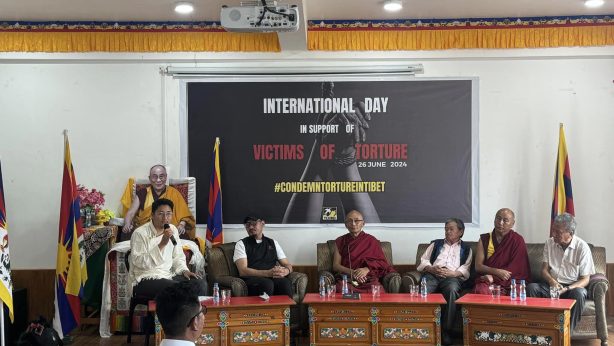TCHRD calls on China to respect lawful rights of detained senior monk
 The Tibetan Centre for Human Rights and Democracy has received information concerning the status and treatment of Khenpo Kartse, also known as Khenpo Karma Tsewang, who was arrested at 1 am on 7 December 2013. Khenpo Kartse is a popular senior religious figure and well respected for his social work and the promotion and protection of Tibetan language, culture and religion. He is the abbot of Jhapa Monastery in Nangchen (Ch: Nángqiān) County in Yushu Tibetan Autonomous Prefecture, Qinghai Province.
The Tibetan Centre for Human Rights and Democracy has received information concerning the status and treatment of Khenpo Kartse, also known as Khenpo Karma Tsewang, who was arrested at 1 am on 7 December 2013. Khenpo Kartse is a popular senior religious figure and well respected for his social work and the promotion and protection of Tibetan language, culture and religion. He is the abbot of Jhapa Monastery in Nangchen (Ch: Nángqiān) County in Yushu Tibetan Autonomous Prefecture, Qinghai Province.
Thousands of supporters of Khenpo Kartse staged a five hour-long sit-in protesting his arrest and demanding an explanation for his arrest. Sixteen monks were arrested during these protests. The last monk was released on 21 January 2014. Despite the sit-in and assurances from the local Monastery Management Committee, Khenpo Kartse was not released and his detention, which has now lasted over three months, has only been justified in the most vague terms. In just over three months of detention, Khenpo Kartse has been subjected to an enforced disappearance, cruel, inhuman, and degrading treatment.
Enforced Disappearance
For the first week of his detention, Khenpo Kartse was held incommunicado. It is still unknown what happened to Khenpo Kartse or where he was held during the first week of his detention.
From 14 December 2013 — 25 December 2013, Khenpo Kartse was held by the Chamdo Police Department’s State Security Bureau officials in Chengdu without his family knowing where or why he had been arrested. At this point, 18 days after his initial arrest, Khenpo Kartse was in poor health and had been severely beaten and tortured during his interrogations.
Under international law, an enforced disappearance is the arrest or detention of a person by a State official followed by the concealment of the fate or whereabouts of the person, which places the person outside of the protection of the law. (See Rome Statute Art. 7(1)(i); International Convention for the Protection of All Persons from Enforced Disappearance Art. 2).
Khenpo Kartse was arrested by Chinese government officials from his hotel room in Wuhou Si Hotel in Chengdu. For 17 days, Khenpo Kartse’s fate and location were unknown. A lawyer hired by Khenpo Kartse’s family discovered where Khenpo Kartse was being held and how he had been treated on 24 December 2013. After discovering where Khenpo Kartse was being held, the lawyer demanded that Khenpo Kartse be moved to the Chamdo Public Security Bureau detention centre, that future interrogations be carried out according to the law, that his family be notified of the reason for his detention, and that his family be allowed to visit him.
The secret detention of Khenpo Kartse violated Chinese domestic legal standards. Article 64 of the Criminal Procedure Law of the People’s Republic of China requires that a detained person’s family be notified of the reason and location of the detention within 24 hours. According to numerous public statements by the Chinese government, torture is illegal in China. However, during Khenpo Kartse’s initial disappearance he was subjected to beatings and severe torture. It can be deduced that the purpose of Khenpo Kartse’s disappearance was to deny him legal protections that prohibit torture.
Therefore, the first 18 days of Khenpo Kartse’s detention when his location and status was hidden and he was denied the protection of Chinese law and tortured constitutes an enforced disappearance in violation of international law.
Cruel, Inhuman, or Degrading Treatment
After Khenpo Kartse’s lawyer intervened Khenpo Kartse was moved to the Chamdo Public Security Bureau Detention Centre. Khenpo Kartse is still in the detention facility. In the Chamdo Public Security Bureau Detention Centre, Khenpo Kartse is subjected to cruel, inhuman, and degrading treatment.
The Standard Minimum Rules for the Treatment of Prisoners, which the People’s Republic of China (PRC) based its prison regulations on, state that all prisoners should receive adequate medical care. (Art. 22) The International Covenant on Economic, Social and Cultural Rights, which PRC is a party to, requires that people be allowed the highest attainable standard of physical and mental health. (Art. 12).
Before his arrest, Khenpo Kartse suffered from hepatitis, bronchitis, tuberculosis and other diseases that require medical care and attention. Since his arrest over three months ago, Khenpo Kartse has been denied all medical care including until recently his necessary medication. This denial of medical care and treatment violates basic international standards for human decency.
Khenpo Kartse’s medical condition has not been helped by his prison conditions. He is currently being kept in a cell that has gone below freezing in the winter and does not receive adequate sunlight. His only meal every day is a small portion of rice in vegetable soup and the tsampa (Tibetan roasted barley) that his family brings. Unsurprisingly, Khenpo Kartse’s medical conditions have worsened. He currently suffers from a sharp pain in his back and has begun ejecting bloody sputum.
The denial of medical care, starvation diet, and the prison conditions all violate international human rights standards that are binding on the PRC. However, what makes Khenpo Kartse’s treatment uniquely degrading and inhuman is that for over three months Chinese officials have refused to let him bathe. This creates an unimaginable situation that seems to be carefully designed to dehumanize and humiliate Khenpo Kartse.
Cruel, inhuman and degrading treatment is prohibited by the Convention Against Torture and Other Cruel, Inhuman or Degrading Treatment or Punishment, which the PRC is a party to, the Universal Declaration of Human Rights, and the International Covenant on Civil and Political Rights.
Therefore, Khenpo Kartse’s treatment, including the refusal to allow him to take a bath, violates the PRC’s international legal obligations and commitments.
The Tibetan Centre for Human Rights and Democracy became aware of the shocking treatment of Khenpo Kartse from a source familiar with the situation who was appalled by his treatment, but wished to remain anonymous because of fear of reprisal. TCHRD urges individuals and groups to call the Chamdo Prefecture Detention Centre (+011 86 0895-4821803) and urge them to provide Khenpo Kartse with immediate medical treatment and a quick, fair, transparent trial.


